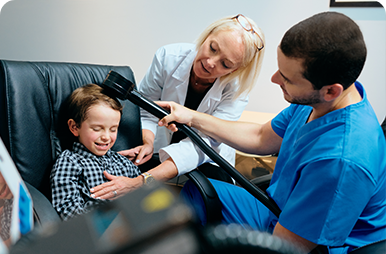
Exceptional In-Home
From help with Activities of Daily Living (ADL) to caring for a medically complex patient, our in-home adult care services are with you for life.
Offering more than just care, providing essential assistance with day-to-day activities, Advanced Care Partners builds trust through reliable, respectful, and professional in-home care services that families can depend on.
Services That Grow with Your Child Into Adulthood
Advanced Care Partners entered the adult care market when our patients started to age out of the pediatric programs we serve. Every family that transitions from caring for a medically complex “child” to caring for an “adult” understands how challenging this time can be.
As our children age, they often require more specialized and intensive care. We build strong bonds with our families that last a lifetime, just like the care we provide. From birth to adulthood, we are your partner for in-home adult care every step of the way.
At Advanced Care Partners, we understand that every individual’s needs evolve over time. That’s why our in-home care services are designed to adapt and grow with your child from childhood to adulthood.
Our dedicated team of professionals works closely with families to develop personalized adult care plans that evolve with your child’s changing needs, ensuring a seamless transition through each stage of life.
With Advanced Care Partners, you gain a lifelong partner in care, providing consistency, stability, and peace of mind every step of the way.
Additionally, we are equipped to support patients who rely on medical technology, including oxygen supplies, tracheostomies, ventilators, feeding tubes, and monitoring devices, among others. Our team is prepared to manage these and other complex medical situations.
Our services include:
- Assistance with daily living activities like bathing, meals, and housekeeping
- Regular monitoring of vital signs, encompassing blood pressure, pulse rate, respiratory rate, and body temperature.
- Aid with mobility, including walking, transferring, and various physical movements
Why Would I Need In-Home Adult Care?
In-home adult care provides the necessary support for individuals facing health challenges, ensuring safety, promoting independence, and enhancing the quality of life in the comfort of one’s own home, offering personalized assistance tailored to individual needs and conditions.
Management of Neurological Disorders
In-home adult care provides personalized support for managing neurological disorders, helping patients navigate daily challenges, maintain routines, and enhance safety.
Caregivers assist with mobility, medication, and therapy, aiming to improve the quality of life and independence for individuals living with neurological conditions.
Support for Cardiac Conditions
In-home adult care offers essential support for those with cardiac conditions, focusing on heart health through medication management, dietary advice, and physical activity.
Caregivers help monitor symptoms, encourage healthy lifestyle changes, and provide assistance with daily activities, contributing to better cardiac care and recovery.
Assistance with Respiratory Diseases
In-home adult care for respiratory diseases ensures patients receive assistance with breathing exercises, medication adherence, and the use of medical equipment. Caregivers focus on creating a comfortable environment, reducing exposure to irritants, and helping manage symptoms, thereby enhancing the patient’s respiratory health and comfort.
Care for Gastrointestinal Diseases
In-home adult care for gastrointestinal diseases includes specialized support such as diet planning, hydration monitoring, and comfort measures to manage symptoms. Caregivers assist with meal preparation according to dietary needs and provide personal care, helping to improve digestive health and overall well-being.
Handling of Metabolic and Neuromuscular Disorders
In-home adult care for metabolic and neuromuscular disorders offers tailored support to manage specific symptoms and challenges.
Caregivers assist with dietary needs, physical therapy, and daily activities, focusing on maintaining mobility, preventing complications, and supporting the patient’s overall health and independence.
Benefits of Choosing In-Home Adult Care
Choosing in-home adult care offers numerous benefits, including personalized support, comfort in a familiar environment, and tailored care plans. This option ensures that adults receive professional assistance while maintaining their independence and dignity.
It provides a balanced solution for families seeking quality care for their loved ones, reducing hospital visits and promoting faster recovery. In-home care encompasses a wide range of services from personal care to medical assistance, all while supporting the family structure and easing the caregiving burden.
Personalized Care Tailored to Individual Needs
In-home care offers customized assistance tailored to the unique needs of each individual, ensuring they receive the right level of support and care. This approach allows for a more personal connection and targeted care, enhancing the overall well-being and satisfaction of the client.
Comfort and Familiarity of Home Environment
In-home care allows individuals to receive professional assistance in the comfort and familiarity of their own homes. This environment can accelerate recovery, ease stress, and improve quality of life by maintaining normalcy and personal preferences.
Flexibility and Customization of Care Plans
In-home care provides the flexibility to adapt and customize care plans as the individual’s needs change over time. This ensures that the care provided continues to be relevant, effective, and tailored to the specific requirements and goals of the client.
Enhanced Independence and Dignity for Adults
In-home care supports the independence and dignity of adults by allowing them to continue living in their own homes while receiving the necessary care. This fosters a sense of autonomy and self-respect, which is vital for overall happiness and well-being.
Support for Families and Caregivers
In-home care offers essential support for families and caregivers, relieving them from the continuous demands of caregiving. It provides peace of mind, knowing their loved one is receiving professional, compassionate, and personalized care, allowing families to focus on spending quality time together.
Types of Insurance Qualifications
Comprehensive Support Waiver Program (COMP)
The COMP waiver is a Medicaid program that serves people with intellectual and/or developmental disabilities who are in need of intensive care.
Through the COMP waiver, patients receive nursing care and personal care support services (also known as CLS or Community Living Support Services). The program supports people over the age of 21.
New Options Waiver Program (NOW)
The NOW waiver is a Medicaid program that serves people with intellectual or developmental disabilities who are not in need of intensive 24-hour nursing care.
Through the NOW waiver, people receive personal care support services (also known as CLS or Community Living Support Services). The program supports people over the age of 21.
Private Insurance
Private insurance plans with companies like Anthem, CIGNA, United Healthcare, AETNA, and more may cover our services. ACP will work with you to acquire the proper authorization from your insurance company. Our goal is to make the intake process as smooth as possible for you.
Private Pay
Private pay is an option that is fully funded by the patient/family. In-home nursing and personal care services, community-based, and out-of-home support settings are permitted.
Private pay can be an option for families in need of additional hours of care not covered by Medicaid or other payers.
Parent Testimonials
COVID-19 Updaets
ACP is fighting by your side against the spread of this threat.
Stay up-to-date on the latest news through our communications page.
Resources for Our Families

Blog
Catch up on the latest news and find out what’s happening at ACP.

Financial Resources
Learn about the insurance approval process and Medicaid program applications.

Helpful Links
Explore a list of useful sites we’ve found that our families need.

Awards
Celebrate with ACP as we honor our caregivers of the month, patient graduations, and more.
Frequently Asked Questions
What is the ACP lifting policy?
ACP adheres to the OSHA guidelines. The maximum weight lifted for one person is 50 pounds. Any weight over this amount requires a two-person or mechanical lift.
If your loved one is over 50 pounds without a mechanical device or another caregiver for assistance, please call your clinical supervisor to discuss options.
Can I receive nursing services and personal care support services at the same time?
Yes, under the COMP/NOW waiver program, services are permitted to overlap due to the patient’s total care needs.
What can I expect from ACP’s caregivers?
Our caregivers are committed to the highest standards and quality of care. They will:
- Dress professionally. Scrubs and closed-toe shoes are required.
- Show up on time.
- Wear their ACP name badge.
- NOT smoke.
- Not carrying firearms or weapons.
- Not drink alcoholic beverages or use illegal drugs.
- Not discuss pay, religion, or politics.
What are ACP caregivers (nurses or CNAs) not allowed to assist with?
Our caregivers are NOT allowed to:
- Babysit or provide care for other children or adults in the home.
- Pick up other children from the bus stop.
- Provide care while the patient is hospitalized.
- Make direct schedule arrangements with the family without ACP’s approval. ACP is responsible for maintaining the patient’s schedule in adherence to the number of approved hours. Any changes to the patient’s staffing hours/duration must be made through and approved by ACP.
- Help with house cleaning, groceries, cooking, etc. Nurses are to perform skilled care only.
- Lend or borrow money to/from families.
- Solicit family members to purchase items from her/him.
- Release the care of the patient to a minor or unauthorized personnel.
- Discuss personal issues, religion, or politics.
Do I need to inform ACP if my phone, address, or email has changed?
If you need to make a change to your personal information, please call the office during normal business hours (9 AM to 5 PM) and speak with your Scheduler.
You must notify ACP regarding these updates so that your services are NOT discontinued. We must have your up-to-date address, phone, email, and patient’s primary caregiver information to submit to the State in order to keep your account active.
Why do I have to sign the caregiver’s nursing notes?
Nursing notes are a key part of the clinical documentation that Medicaid and other payers review when the patient is up for authorization renewal. It is important for you to review the time in and time out, the notes, and the care assessments that the caregiver documents.
This not only gives you a quick review of what happened that day but also verifies the hours that your caregiver has worked. It demonstrates if caregivers are following the Plan of Treatment and the patient’s goals.
If for any reason you do not agree with the clinical assessments that the caregiver completes, call your Clinical Supervisor as soon as possible.
What are the CNA’s duties and responsibilities?
A certified nursing assistant (CNA) provides varying levels of unskilled care and support to our patients. Duties and responsibilities include:
-
- Personal care functions include bathing, toileting, grooming, etc.
- Measuring and recording intake and output, as well as the patient’s vitals.
- Weigh patients using upright, chair, and bed scales
- Assists in turning and positioning patients
- Helps keep residents’ rooms clean and supplied
- Assists with cooking and food preparation
CNAs are NOT allowed to:
- Provide any skilled care such as G-tube care, G-tube feeding, trach care, CVL care,
- CNAs ARE NOT allowed to administer ANY medication. CNAs must assist the patient in self-administering medication, they cannot open any bottles to retrieve medication.
How is ACP’s employee retention rate less than half of the industry's average?
From our humble beginnings, we understood how underserved and unappreciated home care Nurses and Certified Nursing Assistants were. When they join our team, we take care of them so they can take care of you.
We offer great healthcare benefits, the highest average pay in the state, comprehensive incentive packages, paid time off, and more. Here, they feel loved and appreciated at all times — as they should!
When should I call ACP’s on-call number?
ACP is available 24/7 to our families and caregivers. Our office hours are Monday through Friday from 9 AM to 5 PM. After hours and on weekends, we are available on-call for urgent matters. On-call should be used for the following scenarios:
- Your scheduled caregiver has not shown up.
- Your child goes to the emergency room. We must know this so we can notify caregivers as well as submit paperwork to your insurance or GAPP.
- If you have an unforeseen schedule change within the next 24 hours.
- Any clinical questions that can’t wait until business hours.
What should I do in the case of inclement weather or loss of power?
If the patient depends on equipment that requires electricity, make sure its battery has enough charge to support the patient in the event of a loss of power. If power remains out for an uncertain amount of time, transport the patient to the nearest emergency room.
What is the Plan of Treatment (POT)?
The plan of treatment is an individualized care plan built by the ACP based on the patient’s physician’s orders, hospital discharges, and clinical history.
It addresses problems identified in the patient assessment, defines and measures interventions in their care, and provides a measure for the patient’s progress in treatment as well as toward set goals and milestones.
The POT is reviewed and updated at least every 60 days or as needed by the Clinical Supervisor with any progress/updates on the medical conditions of the patient.
How do ACP’s caregivers document the care provided?
ACP provides each patient with a tablet so our caregivers can securely chart electronically. The caregivers may also use their personal devices, such as cell phones, to log in to our secured EMR to chart. Our tablets are company property, and any personal use is prohibited.
Are ACP’s caregivers allowed to bring their kids to work?
Under no circumstances should an ACP caregiver bring anyone into your home other than themselves. If a caregiver ever brings his or her own kids or family members into your home while they are working, please contact us immediately.
How do I access the nursing notes for the care provided to my loved one?
Our clients have 24/7 access to our EMR. Call our office to request your login if you’ve forgotten or haven’t received it.
How can I see my care schedule?
Our clients have 24/7 access to our Scheduling system. Call our office to request your login if you’ve forgotten or haven’t received it.
Can I call my caregiver directly?
ACP’s policy states that you should contact the office for any scheduling or clinical changes.
I’ve received a letter from Social Security about my Medicaid eligibility. What do I need to do?
If you have received a letter from Social Security about your Medicaid eligibility, be sure to read it carefully and follow the directions exactly as they are given. ACP can’t help with anything regarding Medicaid eligibility.
Be sure to turn in the required information to the Social Security office by the deadlines given to you, or you will likely be made ineligible for Medicaid.
When Medicaid eligibility is lost, ACP’s home care services are suspended immediately until the situation is resolved (Medicaid usually takes 30 days to be reinstated).
If your child receives school nursing through ACP, these services won’t be affected.
Can I refer a Nurse or CNA to work for ACP?
Yes, we love referrals! Contact our office directly or visit advancedcarepartners.com/referrals. Click the button below for more information.
I need to escalate an issue. Who should I talk to?
If you have gone through the normal chain of command by speaking to your Scheduler and/or Clinical Supervisor but feel the issue has not been resolved, call the office number and talk to ACP’s Director of Operations or Clinical Manager (clinical issues).
How do I change caregivers?
If you are unhappy with one of your caregivers, please call the office during normal business hours (9 am-5 pm), and speak with your Scheduler to express your concerns. They will work with you on a resolution.
If you are unhappy with one of your caregivers, please call the office, during normal business hours (9 am-5 pm), and speak with your Scheduler to express your concerns. They will work with you on a resolution.
How do I change my schedule?
If you need to make changes to your schedule, please call the office during normal business hours (9 AM-5 PM) and speak with your Scheduler.
How long before a shift can I cancel my caregiver?
If you need to cancel your caregiver’s shift, please give us as much notice as possible. We want to give your caregiver the opportunity to work elsewhere if they are not working with you.
Can I request my caregiver to work extra hours?
If you need to make a change to your schedule, it must be done through the office. Additional hours must be approved by ACP before work. Approvals will be based on the number of hours allotted by your prior authorization from Medicaid or your insurance.
How does ACP bill Medicaid for the services rendered?
Once we receive the electronic nursing notes from the ACP caregiver for the services rendered to the patient, ACP will claim and bill for the hours.
The nursing notes must pass our QA process before being submitted to billing, and that includes having the parents’ signature on the notes. ACP will never bill for any hours that we don’t have the proper documentation for.

